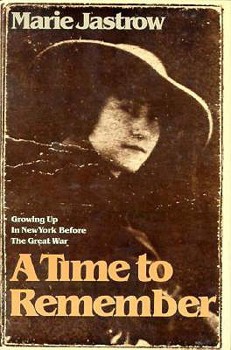A Time to Remember: Growing Up in New York Before the Great War
Marie Jastrow tells the story of conflict in an immigrant family in which her father tried to hold on to old traditions while his wife and daughter enthusiastically adopted the new ways of America. This description may be from another edition of this product.
Format:Hardcover
Language:English
ISBN:0393850013
ISBN13:9780393850017
Release Date:June 1979
Publisher:W. W. Norton & Company
Length:174 Pages
Weight:1.30 lbs.
Dimensions:0.8" x 6.4" x 9.5"
Customer Reviews
2 ratings
Appreciation & Perspective
Published by Thriftbooks.com User , 16 years ago
I picked up this book in an old dusty bookstore in Queens, NY. I was not sure that to expect but was initially intrigued by the pictures of NYC in the 1920s. I found the book to be a quick and easy read and it kept my attention throughout. The author does a wonderful job in balancing a story and an account of history. As an immigrant to America I grew up (outside of America) and experienced some of the same challenges of Ms. Jastrow. More importantly, when I eventually immigrated to NYC, I lived and managed the same types of challenges with my parents as they adopted to the new word. It's interesting how every band of American immigrant finds disparate definition of the American Dream. Reading this book certainly allows you to find commonality and context for all Immigrants at large and their struggles across a century but more importantly allows you to wallow for a brief moment in the thought of how lucky you are to have had others that came before you. -Richie Etwaru
A very warm and touching memoir
Published by Thriftbooks.com User , 16 years ago
The name Marie Jastrow may not ring a bell, but her memoir A Time to Remember is a story most of us can relate to. Her father was a poor unskilled laborer who'd immigrated to America from Austria in 1905. Temporarily leaving his wife and child behind, Marie was about five then, he boarded a ship in Hamburg, Germany, and, along with hundreds of others like him, made the two-week transatlantic voyage. But it was a horrendous ordeal aggravated by a constantly tossing sea and the discomforts of sailing as steerage passengers. It's a fact that animals and cargo were treated better than those poor people. And once arrived at Ellis Island there was always the fear of being denied entry to America, deported if you were sick or held radical political views. Yet, "adventurers, dreamers, scholars, beggars-they came at a time when the gates of America were open to the world," Marie Jastrow fondly recalled when the family reunited in Manhattan. The majority of immigrants stayed but faced even greater challenges. Life was extremely difficult for them because jobs were scarce, wages low and living conditions in the slums appalling. Although Mrs. Jastrow doesn't dwell on urban blight, there are passages throughout the book that hint at the sadness of poverty. Apartments were without heat or hot water; tenants had to provide these for themselves. Coal stoves served as radiators and cooking or baking ranges. The smoke, dust and ashes that gathered throughout those cramped quarters were unbearable. Bathtubs had to be filled by hand and painted white each week to keep them clean-looking. Their new life spurred conflicts between Marie and her mother, who both quickly adapted to life here, and her father, who favored the traditions of the old country. But one can imagine the joy they felt when they moved to better quarters on 81st Street between York Avenue and Riverside Drive. Here they had steam heat, hot running water and a gas stove, which was run by a meter with a quarter slot and handle. And running to neighborhood shops, like Paprika Weiss' grocery, was like visiting relatives. Imagine the kindly grocer, ceiling fans, wooden shelves, sawdust on the floor, and the large pickle barrels in front of the store. This informative memoir describes a very special time in our history, which changed when America entered WWI in 1917. Things were different from then on, she sadly laments. Her world changed dramatically: gone were the immigrants and their hopes, dreams, vitality, features that strengthened this great nation. In 1924, fearing a population explosion and the thereat of foreign influence, with Communism on the rise, America shut its doors. Ellis Island was left to crumble and gather dust. Marie Jastrow's world may be gone, but will never be forgotten. Take a stroll to Paprika Weiss' grocery in Yorkville and ask anyone there about Marie Jastrow.






